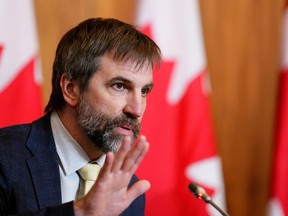Article content
OTTAWA — Fourteen years ago, Canada joined the rest of the G20 in promising to wean fossil-fuel companies off of government subsidies that encouraged wasteful consumption and undermined efforts to slow climate change.
Similar to policy that ended most of Canada’s public financing for international projects

OTTAWA — Fourteen years ago, Canada joined the rest of the G20 in promising to wean fossil-fuel companies off of government subsidies that encouraged wasteful consumption and undermined efforts to slow climate change.
Story continues below
Next week, that promise is expected to be fulfilled.
Environment Minister Steven Guilbeault is set to publish policy guidelines that will dictate the circumstances under which future federal investments can still flow to Canadian oil and gas firms.
“Canada will no longer support subsidies that are directly aimed at the oil and gas sector that give that sector an advantage in comparison to other sectors, and subsidies that help the production of fossil fuels,” Guilbeault said during a media availability ahead of an environment ministers’ meeting in Belgium on July 12.
In an interview from Brussels on July 14, Guilbeault said the policy will be s/
New domestic fossil-fuel projects are only to receive federal funding if the government can square them with Canada’s climate commitments.
Story continues below
He said tax credits or federal aid that helps companies lower their emissions will continue, including for fossil-fuel companies.
That means the new tax credit for carbon capture and storage systems is not on the chopping block.
The policy for international fossil fuel projects published in December barred any new, direct public financing for most “unabated fossil fuel investments,” meaning projects that don’t prevent greenhouse-gas emissions from ending up in the atmosphere.
There are limited exceptions if a project can prove it is consistent with the goal to limit global warming to as close to 1.5 C as possible, and doesn’t delay the transition to renewable alternatives.
It applies to financing from government departments, agencies and Crown corporations, including the Business Development Bank of Canada and Export Development Canada.
Story continues below
Canada has already eliminated nine different tax policies that benefited the oil and gas industry. There are differing opinions on what subsidies remain.
Canada and Argentina launched a peer review of each other’s fossil fuel subsidies in 2018 in a bid to get a better and somewhat independent take on what is in place. That review should have been done in 2020, but still hasn’t been completed, Guilbeault said on July 14.
The Organization for Economic Co-operation and Development said in 2021 that Canada’s domestic subsidies included $3.4 billion in tax policies and $600 million in direct grants.
Advocacy group Environmental Defence argues more should be included in that number, such as the $10-billion loan guarantee Export Development Canada approved for the Trans Mountain pipeline expansion in 2022.
Story continues below
Environmental Defence and the International Institute for Sustainable Development are among the environment groups that also want Canada to include tax credits, government loans and grants that help fossil-fuel producers cut their emissions among the subsidies targeted by the incoming policy.
However, Guilbeault said that won’t be happening.
When Canada first agreed to phase out fossil-fuel subsidies in 2009 under the previous Conservative government, the promise targeted “inefficient” funding. When the Liberals reaffirmed the promise in 2016, they set a deadline for doing so by 2025, then later moved that up to 2023.
But in the 14 years since the initial promise, neither Canada nor the G20 has landed on a definition for “inefficient.” As recently as May 2022, Environment and Climate Change Canada officials said the definition was still being finalized.
Story continues below
Guilbeault would not say what the definition will be, but he has been clear that he does not consider funding to help companies cut emissions to be “inefficient.”
The tax credit for carbon capture also isn’t specific to oil and gas companies, so it doesn’t give them a leg up on other industries, he said.
Environment groups want such technology excluded because they say anything that encourages continued fossil-fuel production is harmful.



They also note that carbon capture systems are new technologies that haven’t yet proven their worth — and even if they do work, they don’t abate the emissions caused by the burning of fossil fuels to power cars or heat homes.
The Canadian Association of Petroleum Producers has previously argued that it is not subsidized at all, and does not consider tax policies to be subsidies.
A spokeswoman said on July 14 the association won’t comment on the new policy before seeing it.
Comments
Postmedia is committed to maintaining a lively but civil forum for discussion and encourage all readers to share their views on our articles. Comments may take up to an hour for moderation before appearing on the site. We ask you to keep your comments relevant and respectful. We have enabled email notifications—you will now receive an email if you receive a reply to your comment, there is an update to a comment thread you follow or if a user you follow comments. Visit our Community Guidelines for more information and details on how to adjust your email settings.
Join the Conversation